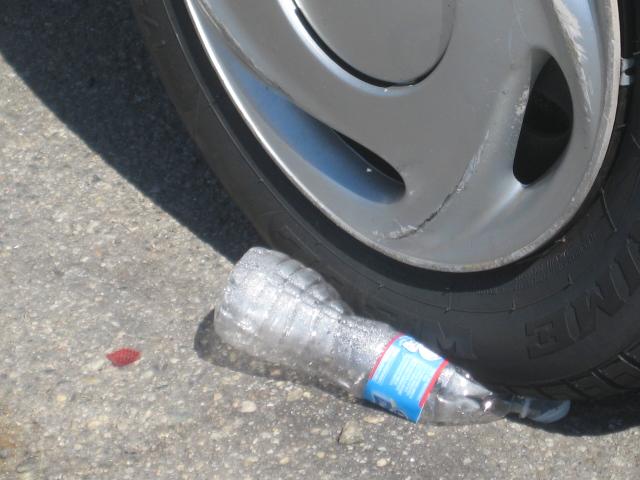Single-use plastic beverage containers are being used to sell an increasing variety of drinks from bottled water and juices to sports drinks, and other non-carbonated beverages. Of these, the bottled water segment has gained considerable market share in the last decade. This explosion in the consumption of bottled water has contributed significantly to the growth of single-use, disposable, polyethylene terephthalate (PET) plastic bottles and bulk containers made of polycarbonate. However, even as their light weight, shatter resistance and portability have made plastic a popular choice for beverage containers, the environmental consequences have been far reaching.

Plastic bottles are made of fossil fuels which require millions of years to form. Americans use around 50 billion single-serve plastic water bottles a year. A recycling rate of around 29% for PET beverage bottles means that the vast majority of the bottles end up in landfills, and billions of new plastic bottles are manufactured from virgin materials every year to meet the demand. Recycled plastic can be more toxic than virgin material[1] and should not be used in food contact applications, so recycled content for bottles (such as rPET) is not the solution. The plastic waste generated as a result of our throw-away society is permanent.
Bottled water impacts our environment, wallet, and health
-
Plastic is a source of litter on land and in our waterways, and poses a risk to our wildlife and marine life. It does not biodegrade and remains in our environment for 1000 years.
-
The carbon footprint of bottled water is 11-31 times greater than that of tap water.
-
Most bottled water is in reality packaged tap water that goes through a proprietary, multi-stage, energy-intensive process. However, bottled water costs as much as 2000 times more per gallon than tap water.
-
Bottled water and other beverages mostly use water treated through a wasteful process known as reverse osmosis.[2] One gallon of a beverage requires at least two gallons of tap or spring water with the remainder becoming wastewater. This figure can be lower for bottled water and higher for beer and juices. These figures do not include the even greater amount of water required to manufacture the packaging.[3]
-
While marketed as a safer and tastier option, bottled water companies are not regulated under the same rigorous standards as public water. In the United States tap water is held to higher purity standards than bottled water.
-
Plastic bottles can also expose us to unwanted health risks. Synthetic chemicals like phthalates and antimony used in the manufacture of plastic have been known to leach into water the longer it sits in the plastic bottle.
How Can I Help?
You can make a difference by making simple changes. Try to avoid buying packaged beverages and choose tap water. Save money and reduce your environmental footprint by using reusable stainless steel or glass bottles for your water needs on the go. Tap water (used in combination with a filter system if preferred) is a sustainable, readily accessible, low-cost, and high-quality alternative to using single-serve bottled water. Many municipalities, schools and national parks have installed water bottle filling stations in an effort to reduce litter and greenhouse gas emissions. You can advocate for increasing access to tap water in your community.
Bottled Water Restrictions
Restrictions on bottled water sale and use are another way to address the problem. Municipal bans are in place in the U.S., Canada and Australia. Massachusetts has been leading the nation on this issue. Retail bottled water bans began in 2012 in Concord. As of June, 2024, 28 Massachusetts communities across 8 counties ban single-use bottled water: Aquinnah (retail), Arlington (municipal & retail), Bourne (municipal), Brewster (municipal & retail), Brookline (municipal), Chatham (municipal), Chilmark (retail), Cohasset (retail plastic only), Concord (retail PETE only), Eastham (retail), Falmouth (retail), Great Barrington (retail), Harwich (municipal & retail), Hingham (municipal & retail), Lexington (retail PETE only), Lincoln (retail), Nantucket (retail), Oak Bluffs (retail), Orleans (municipal & retail), Provincetown (retail), Rockport (retail), Sudbury (retail), Tisbury (retail), Truro (municipal), Wellfleet (municipal & retail), West Tisbury (retail), and Yarmouth (municipal). In April, 2019, West Tisbury on Martha's Vineyard became the first community in the United States to include all single-serve plastic beverage bottles in their retail ban (in other words, this includes coffee, and carbonated and energy drinks) and have been joined by their neighbors in Aquinnah, Chilmark, Oak Bluffs, and Tisbury. Wellfleet added single-serve carbonated beverages in 2022. Note that Sandwich and Mashpee had their retail bottled water bans repealed in 2021 and 2022 respectively before they could be implemented. Dennis' was repealed in 2022 after it had gone into effect.
Nip Bottle Restrictions
In addition, 12 Massachusetts communities have banned the sale of alcoholic beverages in small plastic bottles (under 100 ml in capacity informally known as "nips"): Chelsea (2018), Falmouth (passed September 2020) and Mashpee (November 2020) on the Cape, Wareham (June 2021), Newton (Nov. 2021), Nantucket (May 2022), Brookline (2022 - plastic only), and Brewster and Fairhaven (May 2023 - all nips), New Bedford (July 2023). When Oak Bluffs and Edgartown passed their bans on all nips (April 2023), it means that nips will not be available anywhere on the Vineyard starting in May, 2024. (Plymouth passed a nip ban in 2023 but it was overturned in 2024.)The Massachusetts Chapter of the Sierra Club supports restricting the sale and purchase of single-use plastic beverage bottles.
How do I get a beverage bottle law passed in my community?
1) Reach out to your local elected officials. You may already have a sympathetic legislator.
2) Reach out to family, friends and/or neighbors in your community to create a group of supporters interested in working on a bottle ban.
3) Write a letter to the editor of your local newspaper or media outlet.
4) Reach out to a local environmental group for support.
5) Definitely let us know, as we want to help you!